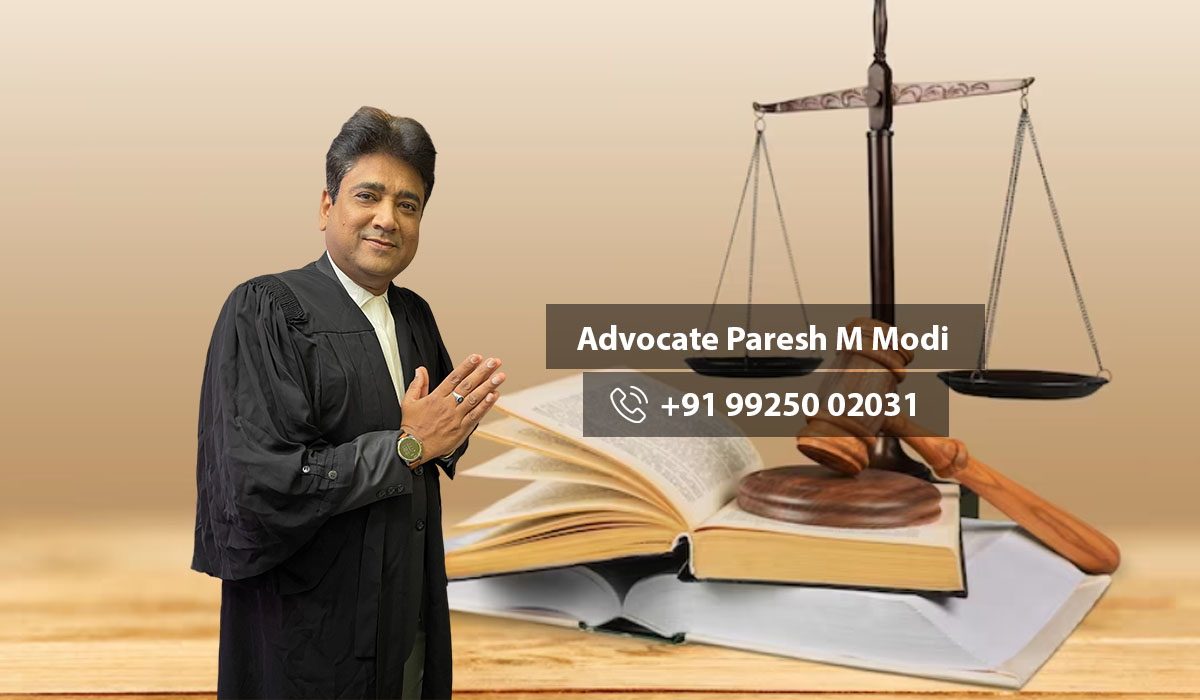Advocate Paresh M Modi – Custodial Rights & Legal Protection Lawyer । Ahmedabad Gujarat
Here is a detailed analysis of the Supreme Court Judgment in D.K. Basu v. State of West Bengal (1997), including observations, guidelines, and directions in English and Gujarati, for uploading on Advocate Paresh M Modi’s website.
D.K. Basu v. State of West Bengal (1997) – Landmark Judgment on Custodial Rights & Arrest Procedures
Case Citation:
D.K. Basu v. State of West Bengal, AIR 1997 SC 610
Background of the Case:
This case was filed as a Public Interest Litigation (PIL) by Mr. D.K. Basu, a social activist, highlighting the issue of custodial deaths and police brutality in India. The Supreme Court took cognizance of increasing reports of police torture, unlawful detention, and human rights violations and issued a landmark judgment laying down guidelines for arrest and detention procedures to prevent custodial torture.
Observations of the Supreme Court
- Custodial violence is a direct attack on fundamental rights under Article 21 (Right to Life and Personal Liberty).
- The increasing number of custodial deaths and police excesses is a serious concern in a democracy.
- Police officers must be held accountable for violating constitutional rights.
- The existing legal framework under Criminal Procedure Code (CrPC), 1973, and the Indian Penal Code (IPC), 1860, must be strengthened to prevent arbitrary arrests and torture in custody.
- There is an urgent need for judicial intervention and procedural safeguards to ensure the protection of detainees.
Supreme Court Guidelines & Directions for Arrest & Custody
The Supreme Court, under Article 141 of the Constitution, laid down mandatory guidelines to be followed by police officers while making arrests:
1. Arrest Procedure Guidelines
- The police must bear accurate, visible, and clear identification tags with their name and designation while arresting an individual.
- The arresting officer must prepare an arrest memo at the time of arrest, which must include:
- Date and time of arrest
- Place of arrest
- Signature of the arrestee
- Counter-signature of a witness (either a family member or a respected local person).
2. Rights of the Arrested Person
- The arrested person must be informed of their right to inform a relative, friend, or legal counsel about the arrest.
- The police must immediately inform the nearest legal aid center about the arrest.
3. Medical Examination & Protection Against Torture
- A medical examination must be conducted every 48 hours by a government-approved doctor for those in police custody.
- Any injury or mark on the body must be documented.
4. Production Before a Magistrate
- As per Section 57 of CrPC, no person can be detained beyond 24 hours without being presented before a Judicial Magistrate.
5. Police Diary & Case Record Maintenance
- The police must maintain a diary with full records of the arrest, interrogation, and movement of the accused in custody.
- This record must be reviewed by a Magistrate for transparency.
6. Legal Representation & Judicial Scrutiny
- The accused has the right to meet their lawyer during interrogation.
- Courts must monitor custodial conditions and ensure compliance with the guidelines.
Legal Impact of the Judgment
The D.K. Basu case became the foundation for custodial rights and legal protection against police abuse in India. The ruling emphasized that:
- Torture, third-degree methods, and custodial deaths violate Article 21 of the Constitution.
- The State is responsible for police misconduct, and victims can seek compensation and legal remedies.
- Any non-compliance with these guidelines by police officers can result in departmental action, criminal prosecution, and contempt of court proceedings.
Gujarati Translation (ગુજરાતી ભાષામાં)
D.K. Basu વિ. પશ્ચિમ બંગાળ રાજ્ય (1997) – પોલીસ દ્વારા ધરપકડ અને કસ્ટોડીયલ રક્ષણ અંગેનો મહત્વનો ચુકાદો
કેસ સાઈટેશન:
D.K. Basu v. State of West Bengal, AIR 1997 SC 610
કેસની પૃષ્ઠભૂમિ:
D.K. Basu, એક સામાજિક કાર્યકર, ભારતમાં પોલીસ અત્યાચાર અને કસ્ટોડિયલ મોત અંગે ચિંતિત હતા. તેમણે સુપ્રીમ કોર્ટમાં જનહિત અરજી (PIL) દાખલ કરી, જેમાં પોલીસના અત્યાચાર, ગેરકાયદેસર ધરપકડ અને માનવ અધિકાર ઉલ્લંઘન સામે રક્ષણ આપવાની માંગ કરવામાં આવી.
સુપ્રીમ કોર્ટના અવલોકનો
- કસ્ટોડીયલ વાઇલન્સ એ મૂળભૂત અધિકારો (Article 21 – જીવન અને વ્યક્તિગત સ્વતંત્રતા) પર સીધી ખોટ છે.
- ગેરકાયદેસર ધરપકડ અને ત્રાસજનક પોલીસ વર્તન લોકશાહી માટે મોટો ખતરો છે.
- પોલીસ અધિકારીઓની જવાબદારી નક્કી થવી આવશ્યક છે.
- CrPC, 1973 અને IPC, 1860ના કાયદાઓ વધુ મજબૂત કરવામાં જોઈએ.
- કાયદાકીય સુરક્ષા માટે ન્યાયિક હસ્તક્ષેપ જરૂરી છે.
સુપ્રીમ કોર્ટ દ્વારા ઘડાયેલા નિયમો અને દિશા-નિર્દેશો
1. ધરપકડ પ્રક્રિયા માટે નિયમો
- ધરપકડ કરનાર પોલીસ અધિકારી સપષ્ટ ઓળખ સાથે બેજ પહેરશે.
- અરેસ્ટ મેમો તૈયાર કરવો જરૂરી છે, જેમાં નીચેની વિગતો સમાવેશ થશે:
- ધરપકડનો સમય અને તારીખ
- જગ્યા
- અટકાયેલ વ્યક્તિની સહી
- સાક્ષી (પરિવારજનો અથવા સામાજિક વ્યક્તિ) ની સહી
2. ધરપકડ થયેલા વ્યક્તિના હકો
- પરિવારજનો, વકીલ અથવા મિત્રને ધરપકડની જાણ કરવાની અનુમતિ.
- નજીકના કાયદાકીય સહાય કેન્દ્રને જાણ કરવી ફરજિયાત.
3. તબીબી તપાસ અને નિરીક્ષણ
- દર 48 કલાકે એક તબીબી તપાસ કરાવવી જરૂરી છે.
- કોઈ પણ ઈજા કે શારીરિક નિશાનનો રેકોર્ડ રાખવો.
4. ન્યાયાધીશની સમક્ષ રજૂઆત
- CrPC 57 મુજબ, 24 કલાકથી વધુ સમય માટે કોઈ પણ વ્યક્તિને અટકાવવામાં નહીં આવે.
5. પોલીસ રેકોર્ડ અને તપાસ ડાયરી
- દરેક ધરપકડનો વિગતવાર રેકોર્ડ રાખવો જરૂરી છે.
6. વકીલ સાથે મુલાકાત અને ન્યાયિક દેખરેખ
- ઇન્ટરોગેશન દરમિયાન વકીલ સાથે મળવાની મંજૂરી આપવી પડશે.
- અદાલતોએ કસ્ટોડીયલ હક્કોની સમીક્ષા કરવી જરૂરી છે.
For expert legal assistance in custodial rights, police brutality cases, wrongful arrests, and human rights violations, contact Advocate Paresh M Modi:
- Mobile: +91 9925002031 (Only WhatsApp sms – Timing 9 am to 9 pm)
- Office Landline: +91-79-48001468 (For Appointment Only – Timing 10.30 am to 6.30 pm – On Working Days)
- Email: advocatepmmodi@gmail.com
- Website: www.advocatepmmodi.in
- Office Address: Office No. C/112, Supath-2 Complex, Opp. Kohinoor Plaza Hotel, Near Old Wadaj Bus Stand, Ashram Road, Ahmedabad – 380013, Gujarat, India.
Real Reviews from Clients of Advocate Paresh M. Modi

